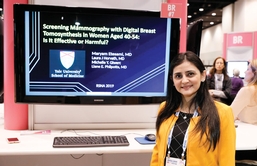The issue of what age to start mammogram screening has generated a fair amount of controversy. Whereas the American College of Radiology, Society of Breast Imaging and the American Society of Breast Surgeons all recommend starting screening mammography at age 40, others recommend starting at age 45 or even 50.

Etesami
At the center of this controversy is the discussion of benefits vs. harms. The lower incidence of breast cancer and the higher rate of false positive recalls for younger women has led some to suggest that screening younger age groups is not effective. However, the implementation of digital breast tomosynthesis (DBT) may provide data toward ending the debate.
"DBT is a newer technique that, compared to conventional digital mammogram, has been shown to reduce false positive recalls while also increasing cancer detection rates," said Maryam Etesami, MD, an assistant professor and service chief of breast MRI at Yale University School of Medicine. "Therefore, screening with DBT may be even more beneficial in younger women compared to data available from conventional mammogram, which is what the current age recommendations are heavily based on."
Comparing DBT Performance in Different Age Groups
During a Wednesday session, Dr. Etesami shared the results of a recent study on the performance metrics of DBT mammogram screening in women aged 40 to 54.
The study retrospectively compared the performance metrics of DBT screening and characteristics of DBT screen-detected cancers in three age groups: 40–44, 45–49, and 50–54 years old. The DBT screenings, which were offered to all women at no additional cost, took place at four imaging centers (one academic center and three outpatient sites) from 2012 to 2018. The study comprised 52,360 DBT screening mammograms (14,757 in the 40–44 age group, 17,649 in the 45–49 age group and 19,954 in the 50–54 age group).
After analyzing the data, researchers found that the cancer detection rate with DBT screening in women aged 40–44 and 45–49 is not significantly less than in women aged 50–54. Furthermore, the majority of screen-detected cancers in women aged 40–49 were invasive and moderate- to high-grade, but without axillary lymph node involvement at the time of diagnosis.
Researchers also found that the overall recall rate is higher in younger women. However, according to Dr. Etesami, this difference is likely due to a higher percentage of baseline mammograms and lack of comparison studies in younger women. "There is no significant difference in recall rate between the three age groups when comparing baseline and non-baseline exams separately," she said. "Biopsy rates were also low in all three age groups (about 1.5%), without significant difference."
DBT is Effective, Shows Little Risk for Harm
According to Dr. Etesami, this study provides more evidence to justify starting screening mammography at age 40.
"DBT screening in women aged 40 to 49 is both effective and has little risk for potential harm or false positive diagnoses," she added. "Delaying screening may only shift the higher recall rate of baseline mammograms to older women, while losing the opportunity to detect aggressive cancers at an earlier stage."
Related links:

